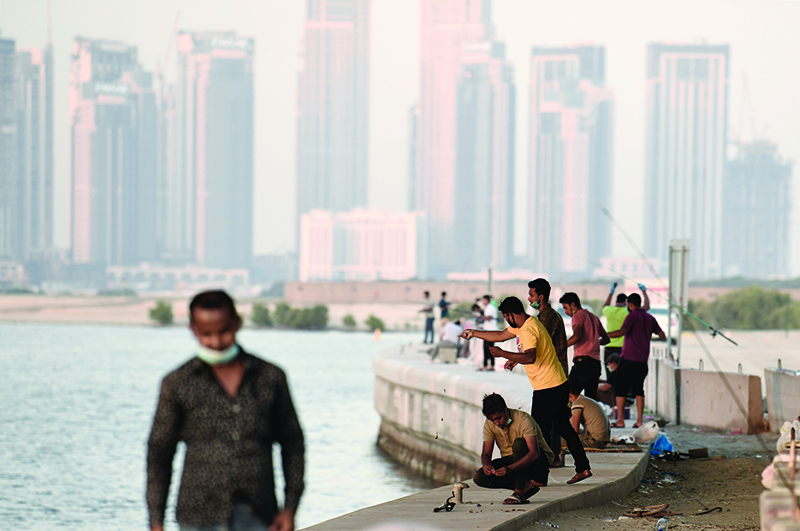

DUBAI: The number of coronavirus cases in the six Gulf Arab states doubled in less than a month to surpass 200,000, according to a Reuters’ tally, at a time the region’s two biggest economies move to resume activity. Coronavirus infections in the energy producing region, which crossed the 100,000 mark on May 11, had initially been linked to travel but then spread among low-income migrant workers in overcrowded quarters, prompting authorities to increase testing. Saudi Arabia, which has the most infections, said restrictions would be lifted in three phases, culminating in a curfew completely ending from June 21, with the exception of the holy city of Makkah.
Saudi Arabian airlines will operate some domestic flights from Sunday. Government sector workplace attendance, suspended since March 16, will resume gradually on May 31 and state media said on Wednesday private sector employees could go to offices. The Haj and Umrah pilgrimages, which attract millions from around the world, remain suspended. In United Arab Emirates, business and trade hub Dubai removed restrictions on movement and business operations between 6:00 am and 11:00 pm. It allowed cinemas, gyms and some entertainment attractions to reopen after permitting malls and dine-in restaurants to do so last month. Workplace attendance in Dubai is now permitted at 50%.
The UAE’s capital Abu Dhabi has so far maintained a nationwide curfew from 8:00 pm to 6:00 am, but has also allowed malls and dine-in restaurants to operate with limited capacity. The UAE government would allow minimum 30% of workplace attendance in all federal ministries, authorities and institutions, starting from May 31, state news agency WAM reported late on Wednesday. It was not yet clear whether other Gulf states that tightened restrictions would follow suit. Qatar, which has the second highest infection count, halted all commercial activities from May 19 to May 30. Kuwait imposed a 24-hour curfew on May 10 but said it would return to a partial one at the end of May.
Virus catastrophe
Six years of war have wrecked Yemen’s health system and left it facing a "catastrophe” from the coronavirus pandemic, international medical charity Doctors Without Borders (MSF) warned. Dozens have already died in the government’s interim capital Aden, according to MSF, even though the country has officially registered fewer than 200 cases and 30 deaths. The city, which is home to 550,000 people, has taken virtually no preventive measures and there are no quarantine facilities for those who test positive.
Yemen’s health system has all but collapsed since fighting broke out in 2014, with more than two-thirds of the population dependent on aid for survival, according to the United Nations. MSF said the number of patients being admitted to its Aden treatment centre - the only dedicated COVID-19 facility in the whole of southern Yemen - "speaks to a wider catastrophe unfolding in the city”. In the first half of May, MSF said at least 68 virus patients had died - more than double the official figure for the entire country since the start of the pandemic. "Many patients are arriving at the centre already suffering from acute respiratory distress syndrome, making it hard to save their lives and suggesting that many more people are sick at home,” MSF said.
The charity added that burial statistics suggested as many 80 people had been dying in Aden every day for the past week, up from a pre-outbreak rate of 10. Health sources have told AFP that many doctors in Aden have deserted their posts because of a lack of access to protective gear. "What we are seeing in our treatment centre is just the tip of the iceberg in terms of the number of people infected and dying in the city,” said Caroline Seguin, MSF’s operations manager for Yemen. "People are coming to us too late to save, and we know that many more people are not coming at all: they are just dying at home. It is a heart-breaking situation.”
She said the United Nations and donor states had to do more - including finding a way to mobilize health workers and get supplies of protective equipment. The government, backed by a Saudi-led coalition, is fighting Houthi rebels supported by Iran in a conflict that has killed tens of thousands - triggering what the UN has termed the world’s worst humanitarian crisis. The Houthis stormed the capital Sanaa in September 2014 and Aden was set up as the government’s interim seat months later. But tensions between the central government and another group of rebels in the south have further muddied the waters, with the self-proclaimed Southern Transitional Council declaring self-rule on April 26. —Agencies

